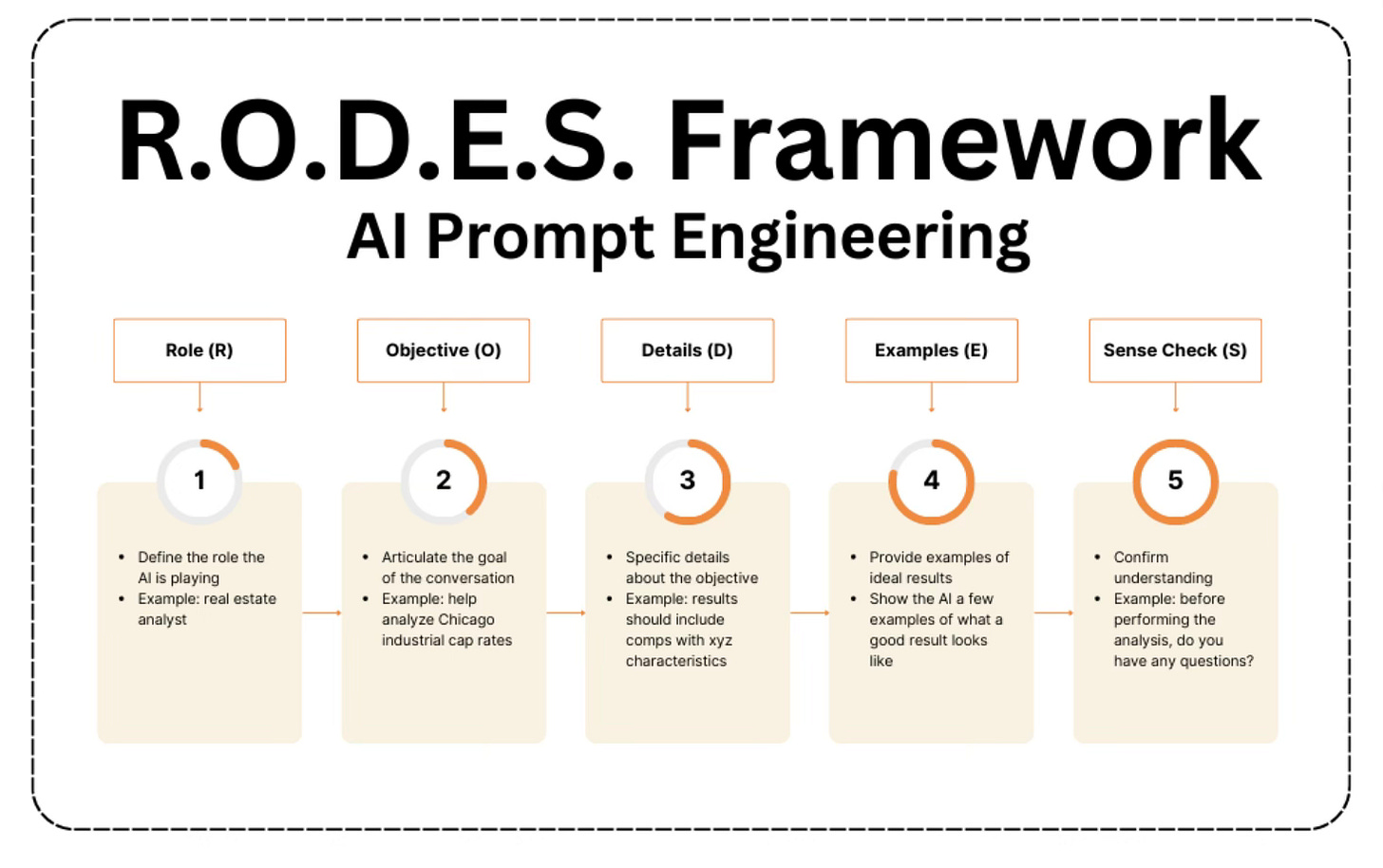Practical Advice on Integrating AI into Your Real Estate Work Flows.
It's not easy, but it's something you can get started on today.
I’m in the business of connecting people, places, and capital to create development projects.
If you don’t know me personally, my colleagues and I are opportunistic real estate developers. We have developed properties from mixed-use retail & multifamily all the way to urban, last-mile, warehouse. Nothing is out of bounds, but we are extremely selective since we are risking our own capital.
So with this opportunistic focus, we need a grounded and practical approach to operations and marketing. So as we begin 2024 we recognize the need to develop our operational processes more formally and to integrate AI as a key part of those processes.
This led us to our LineUp newsletter series on AI. In it we are doing a deep dive into use cases for AI, so you don’t have to. Enjoy and we would love to hear your thoughts, so reach out or comment below.
In Part I of our AI in Commercial Real Estate Series, we explored using AI to produce marketing materials for our projects… which provided some value-add but was not quite what we expected.
In Part II of the series, we produced a custom GPT, Chaz Your Favorite Industrial Real Estate Bro. We loaded up the GPT with some fun CRE Bro stereotypes and industrial research reports from our favorite markets to see what we could create. It was a fun exercise. It was useful because it helped us form a basis for moving forward with how to integrate a custom GPT into our workflows.
In this week’s newsletter we explore how to create a comprehensive AI Business Strategy, we provide some detail on a prompt engineering framework you can use, and we share valuable business use cases.
Start with an AI Business Strategy
I’m someone who likes to think about strategy, and then dive right in. But when working with AI, it is very important to first identify the problem we want to solve.
According to Stanford researchers, in their article 4 Steps to Building an Effective AI Strategy, the best steps to begin are:
Define the problem and identify opportunities that AI can help you address.
Consider your timeline - how much do you have to invest and how much of your resources do you want to commit to an AI strategy?
Create a roadmap - What are the steps to implementation? What resources and team members will be necessary at each stage? How do you measure success?
There 3 Pillars: Data, Algorithms, and Infrastructure
Data strategy - what is the dataset? How will you access it? How much will it cost? What format does it need to be?
Algorithm strategy - Algorithms are the heart of your AI strategy. What are you going to use? How will you deploy them? Who will design, develop, and validate the models?
Infrastructure strategy: Do you have the compute power to run the models? If not, where will you get them? Will you use your own infrastructure or employ 3rd party platforms?
The Problem You Want to Solve
What problem do you want to solve? This should drive your decision making and will be the core of your AI business strategy.
Without answering it, you cannot move forward. So take time with your team to figure out your priorities before proceeding to the next steps.
Keep in mind, the AI won’t tell you what to prioritize.
A handy way to think of AI is that “it helps you to do, rather than to think”. It won’t tell you which path to travel, you and your team have to make that decision yourself.
Some common problems to solve for real estate pro’s include,
How do I source more deal flow?
How do I find the right investors for certain deal types?
How can I analyze deals more quickly?
How can I summarize and write legal documents (LOI’s, PSA’s, etc.) more quickly and effectively?
Once the question you are trying to answer is identified it is time to move to the next step.


What Data Sets Do You Have to Work to With?
When beginning your AI Strategy process one thing to consider is what data you need to make business decisions today. Is that data publicly available or proprietary?
An example would be, if you decide to prioritize the use of AI to help you find developable real estate properties.
Then, you might use a publicly available dataset containing ownership data, parcel sizes and land use ordinances for your target submarket.
Another example, is you want to financially analyze deals more quickly, then creating a proprietary dataset of all the latest rent, occupancy, and operating data into your GPT model would be an excellent place to start.
Whatever activities you believe generate the most value for your business today, should drive your decision making on the company's AI priorities.
It is important to note, this is an iterative process. First you consider first your strategic priorities, then you consider what data you have, then you must revisit your initially stated priorities.
This iterative process ensures your priorities and data availability/quality are aligned. This saves time when you subsequently determine your business AI Timeline and Implementation Roadmap. The creation of a timeline and roadmap are specific to your business needs and we will not explore those here for brevity’s sake.
While researching the use of AI for our business we found that creating a prompt engineering framework for our employees allows us to more efficiently leverage the models we currently have access to.
Create a CRE Prompt Engineering Framework
If you and your team are looking to capitalize on AI now, you need a framework to create the most effective prompts.
Enter the R.O.D.E.S. Framework developed by Sebo, an AI engineer, this framework. It is memorable, simple, and effective. It helps you create prompts that work!

We are using this prompt framework in our business to build out our Pugh Management Prompt Library.
So now that we have introduced both strategy and a prompt engineering framework, what are some additional use cases for real estate pros?
Additional Use Cases for Real Estate Pro’s
In previous posts we explored the use of AI for generating marketing copy. Our quick take is that it works, but you’ve got to extensively train your model. Below we explore some additional use cases for real estate business owners and entrepreneurs.
Use Case Example 1: Real Estate Market Data Overview
When we created Chaz, our Industrial Real Estate Bro GPT, we uploaded a series of market research reports from the big brokers in a couple of our key markets. These reports produced valuable results but no major insights. The model basically just pulls up the data quickly as a reference, and we can flip through the market research reports ourselves.
So to go further we plan build a private GPT available internally only at Pugh Management. To produce a model with valuable insights, we are building our own proprietary data set, using both our data and publicly available data. Some data we will upload include rents, vacancies from quarterly research reports, construction prices, interest rates, and other economic/demographic data .
All of this should provide a significant reference as we build our investment strategies.
Use Case Example 2: Writing LOI’s and Summarizing Leases
Writing a letter of intent is an essential part of negotiating the terms of a real estate deal.
In every deal, we need to make sure we have our bases covered in legal terms, while also capturing the intent of the business discussion. A business deal is usually discussed over the phone or in person, and one party agrees to summarize the terms in a non-binding LOI.
In our processes at Pugh Management, we typically reuse a previous LOI, then modify certain clauses to align with the new deal.
So, how can ChatGPT save you time? A GPT can help you draft LOI clauses you need to create or rewrite based on the terms of the current deal.
Again, similar to creating ad copy for marketing purposes, you can use it to create useful LOI clauses you have to draft. But this is not a cure all solution. It will “help” you draft an LOI, it will not draft the entire thing without supervision.
Another, similar use is to upload a lease and have it summarize key terms.
Extracting the most important points from a 100 page lease can save a significant time. It frees up your team to do more value-added activities.
I recently tried this on our office lease and was able to get some of the important terms. This is something we will continue to work on.
Right now the processes where we see immediate value are in marketing, creating market data summaries, and in the drafting of simple clauses in legal documents. And to do this in an efficient manner you should create an internal prompt library for use by your team members.
In the future, we plan to build and train larger, more complex models for analysis and of sourcing deals. This will take a significant investment of time and resources. I am excited by this prospect believe it could be a way for our team to level the playing field with bigger competitors.
Thanks for reading! I’d love to hear more about your experimentation with AI. Send me an email at john@pughmgmt.com or drop us a comment.
Cheers, John
Thank you to our sponsor Social4CRE.com!
Links we are reading this week:
We are down to the Final Four! UConn, Purdue have been expected by just about everyone’s bracket…Alabama and NC State are definitely great surprises. I’m personally very happy for NC State and would love to see them win it all…though my money is on UConn. Who do you think is going to win the championship?
In the NBA, Webanyama continues to dominate for the Rookie of the Year prospects. I watched he and the Spurs play the Warriors over the weekend. He is so much fun to watch as you never know what he will do next!
The NBA Playoffs are lining up to begin this month. I’m excited to see the Orlando Magic make some noise, finally and of course to cheer on the Boston Celtics! Who do you like? The Timberwolves are a fun team to watch and should go very deep, though they are in a three-way tie for 1st place in the West with Denver and OKC. It is an exciting time of year!
Some links we are reading from Half-Court!










